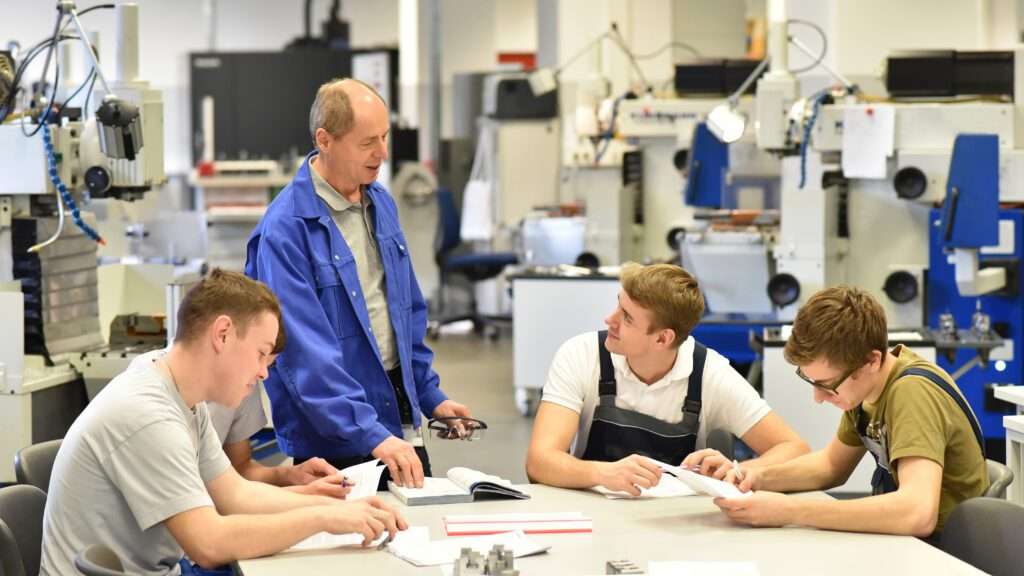The world around us relies on skilled tradespeople. From plumbers and electricians to carpenters and heating, ventilation, and air conditioning (HVAC) technicians, these professionals keep our homes and businesses functioning smoothly.
These rewarding careers offer a unique path to success, and the skilled trades industry is thriving, making it a great time to consider this exciting field.
Why Choose Skilled Trades?

The skilled trades are experiencing a surge in popularity, and for good reason. Here’s what attracts a growing number of career seekers:
High Demand, High Security
An aging workforce and increasing infrastructure needs create a significant demand for skilled tradespeople across various industries. This translates to excellent job security, as your skills will always be in high demand.
Competitive Salaries and Growth
Skilled trades professionals often earn competitive salaries and benefits packages. Depending on your specific trade and experience, you can expect a comfortable living wage with clear opportunities for advancement.
Fast-Track to Success
Compared to traditional four-year degrees, pursuing a career in the skilled trades offers a faster and more cost-effective path. Apprenticeship programs and vocational training allow you to gain valuable experience while earning money, setting you on a quicker path to a rewarding career.
Pride in Your Work
Skilled trades offer a unique sense of accomplishment. You’ll see the tangible results of your work, knowing you’ve built, repaired, or maintained something that will benefit others. This feeling of pride in your craftsmanship is a truly rewarding aspect of these careers.
Variety and Lifelong Learning
The skilled trades offer a diverse range of fields, each with its own specializations. Whether you’re drawn to electrical work, plumbing systems, carpentry, or HVAC technology, there’s a path that aligns with your interests. Plus, the industry is constantly evolving, so there’s always an opportunity to learn new skills and techniques throughout your career.
But what does it take to become a skilled tradesperson? While classroom learning provides a strong foundation, there’s one crucial element that separates those who simply know from those who can do: hands-on experience.
Why Textbooks Can’t Prepare You for Everything
Imagine learning electrical wiring from a textbook. You understand circuits, voltage, and safety protocols—all vital knowledge. However, can you confidently troubleshoot a faulty outlet based on diagrams alone? Probably not.
Skilled trades involve intricate tasks that demand both theoretical understanding and practical application. Textbooks provide a great starting point, but they can’t replicate the real-world challenges you’ll face on the job.
Plumbing repairs rarely involve pristine pipes and textbook-perfect layouts. You’ll encounter unexpected issues, corrosion, and tight spaces. Practical experience equips you to adapt, improvise, and solve problems creatively on the fly.
Imagine this: A technician arrives at a job site, armed with textbook knowledge for installing a brand-new HVAC unit. But here’s the twist: the existing ductwork simply isn’t compatible with the new system.
Textbooks can’t prepare you for every surprise on the job. Hands-on experience allows the technician to adapt. They can assess the situation, brainstorm solutions (like modifying the ductwork or recommending a different unit altogether), and ensure the project gets completed successfully.
Building Muscle Memory and Confidence: The Hands-On Advantage
Remember learning to ride a bike? Manuals and videos can only get you so far. It’s the feeling of the handlebars under your hands that truly cements the skill. Skilled trades are similar. Hands-on experience builds muscle memory—repetitive tasks like hammering nails, crimping wires, or soldering connections become second nature.
This frees you to focus on complex problem-solving during a job. You develop a natural spatial awareness, allowing you to visualize the final product and manage the worksite efficiently.
Imagine a carpenter framing a house. Day in and day out, they measure, cut, and assemble lumber. This constant practice isn’t just about getting the job done; it’s about honing their craft. Over time, they develop a sharp eye for precise measurements and an uncanny ability to visualize how different pieces will come together.
This translates into both efficient work and immense confidence. As you master new skills and successfully complete projects, you see tangible results. You gain the self-assurance to tackle challenges head-on, knowing you have the necessary expertise. This confidence manifests directly in the job market, making you a highly desirable candidate for employers.
Exploring Different Options to Gain Practical Experience
Now that we’ve established the importance of practical experience, how do you get it? Here are some exciting options to explore:
Apprenticeships
Structured programs that combine classroom learning with on-the-job training under experienced professionals. You’ll earn while you learn, gaining valuable hands-on experience and industry certifications.
Internships and On-Site Training
Many companies offer internship and on-site skilled trades training programs. These provide hands-on experience in real work environments, allowing you to learn from seasoned professionals and participate in ongoing projects.
Volunteer Work and Personal Projects
Don’t underestimate the power of volunteering! Organizations like Habitat for Humanity often need skilled-trades assistance. You can also gain experience by tackling personal projects at home, like building furniture or repairing minor plumbing issues.
With these options, you can gain the hands-on experience needed to launch your career in the skilled trades.
Resources for Practical Experience to Find Your Perfect Fit
Here are some resources to help you gain practical experience:
Online Platforms
Websites that specialize in job listings often feature apprenticeship and internship opportunities. Trade association websites might also have dedicated job boards.
Trade Unions
Many trade unions offer apprenticeship programs and connect members with potential job placements.
Trade Schools or Community Colleges

Look into local trade schools or community colleges for vocational training programs that combine classroom learning with hands-on labs.
Local Businesses
Don’t be afraid to contact local contractors, electricians, or plumbers directly. They might be open to taking on an apprentice or intern.
With these resources at your fingertips, you’re well on your way to securing the practical experience you need to succeed in your chosen skilled trade.
From Theory to Reality: Building a Fulfilling Career
Remember, practical experience isn’t here to replace theoretical knowledge. It’s the missing piece that transforms textbook concepts into real-world skills. By combining classroom learning with hands-on experience, you’ll graduate with the confidence and expertise employers seek.
The skilled trades offer a unique opportunity to leave a lasting impact. By mastering a trade, you’ll not only build a secure career, but you’ll also play a vital role in keeping our communities functioning and thriving.
Are you ready to make a difference? The skilled trades are calling, and the Skilled Trades College of Canada can help you get started. Explore their programs, discover your perfect trade, and launch into a rewarding journey of hands-on learning and professional success.






